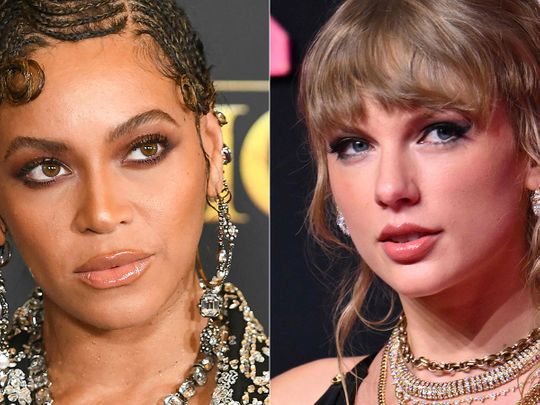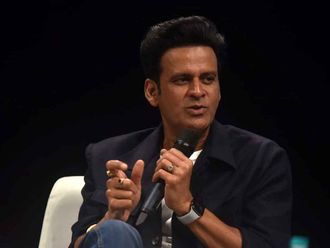
ALSO IN THIS PACKAGE
- From Taylor Swift to Camillo Cabello, the Hollywood celebrity breakups of 2023
- Taylor Swift, Mr Bean, Tina Turner, Britney Spears, and more: Times when impersonators of pop stars courted controversy
- Photos: Taylor Swift, Shakira shine at MTV Video Music Awards
- In photos: Taylor Swift, Lady Gaga and other chart-storming musicians who also rocked as actors
It's rare for a news outlet to dedicate a reporter to one personality, but the publication USA Today has decided Taylor Swift and Beyonce are phenomena requiring their own beats.
The recent announcement by Gannett, which owns USA Today, that it was seeking two journalists to cover the biggest names in music as if they were running for president triggered both excitement and eyerolls - and broader conversation about coverage priorities in an increasingly fragmented and financially precarious news media environment.
Gannett, which owns more than 200 daily newspapers, has slashed jobs across local markets over the past several years, laying off six percent of its news division in December. So news of the Tay and Bey positions struck a nerve.
"I suppose now is a good time to remind Twitter that I'm the only full-time news reporter left at my newspaper that was sold by Gannett in December," said Brad Vidmar on X, the platform formerly known as Twitter. Vidmar, 41, works for The Hawk Eye, a newspaper in Burlington, Iowa that GateHouse, an investment firm-run publishing company, purchased in late 2016.
In 2019 GateHouse acquired Gannett and took its name, becoming the largest newspaper company in the nation - and one with a reputation for scooping newspapers before curtailing their resources. Gannett resold The Hawk Eye to a family-owned media company in late 2022 - its staff a skeleton of what it once was.
"They just kept cutting and cutting and cutting staff all across the board," Vidmar told AFP. "What you saw was a situation where there are less reporters, reporters forced to take on multiple beats."
Losing local content meant filling the paper with wire stories or stories from the broader USA Today network, he explained. Vidmar said Gannett's announcement of the Swift job made "my eyes roll." "They've been downsizing newsrooms for years now, but of course they need somebody dedicated to covering Taylor Swift," he said.
Shaping a generation
Gannett said the new positions will be employed by USA Today and The Tennessean, the company's Nashville-based paper.
The aim of the new jobs - which are in addition to three music reporters The Tennessean now employs - will be to "capture the excitement around Swift's ongoing tour... while also providing thoughtful analysis of her music and career," Gannett said. Another position is aimed at similarly analyzing Beyonce's impact.
The NewsGuild's New York branch was skeptical, writing on X: "Gannett's strategy to be profitable again: 1) Lay off hundreds of reporters 2) Destroy local news coverage 3) Hire a Taylor Swift reporter."
Lark-Marie Anton, Gannett's chief communications officer, said in a statement to AFP that "these roles do not come at the expense of other jobs," noting that in Gannett's bid to "grow our audience" the company has hired 225 journalists since March and has more than 100 open roles.
"Taylor Swift and Beyonce Knowles-Carter are artists and businesswomen. Their work has tremendous economic impact and societal significance influencing multiple industries and our culture - they are shaping a generation," Anton said.
Under pressure
Robert Thompson, a media scholar at Syracuse University, said his initial reaction to the new jobs was questioning whether "this is a joke."
But he said after more reflection "I think it would be silly to categorically dismiss this... There are so few things that everybody really kind of knows whether they're fans or not, and Beyonce and Taylor Swift are some of the very rare ones."
The jobs have the potential to allow for "really insightful ways to tell the story of 21st-century America through the lens of its most popular personages," he said. On the other hand, Thompson acknowledged that negative reaction to the new jobs in light of dwindling local news coverage is reasonable.
"If you were to get a bunch of people together and say, 'We've got X number of dollars, how should they be spent?' Most of them would probably not say the Taylor Swift beat," he said.
"But that doesn't mean that separate from that context there can't be some really good things to come of it."
If performed correctly, the new jobs are not necessarily the "dream" careers some headlines have touted them as, he said.
The fan bases for both Swift and Beyonce are notoriously defensive - music critics who make even the slightest negative comment about their idols can be doxxed or receive death threats.
And along with the "organized wrath" of Swifties and the Beyhive, the worlds these artists have curated are famously guarded.
Plus, Thompson noted, "the eyes of the profession are going to be on these poor folks when they finally get hired." "That first piece that they file - it better be really good."











